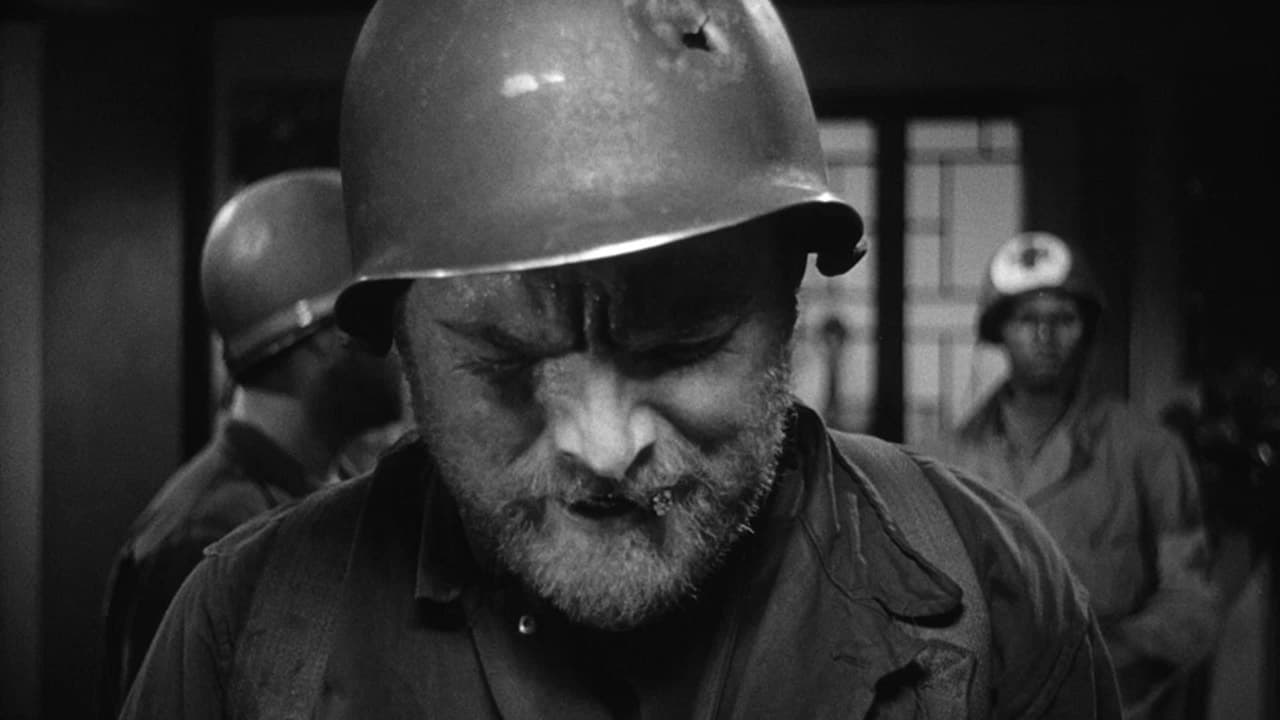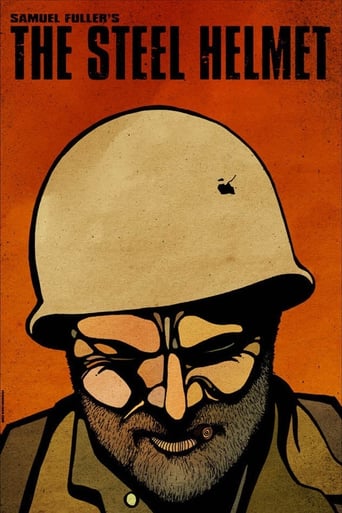Kattiera Nana
I think this is a new genre that they're all sort of working their way through it and haven't got all the kinks worked out yet but it's a genre that works for me.
BlazeLime
Strong and Moving!
Maidexpl
Entertaining from beginning to end, it maintains the spirit of the franchise while establishing it's own seal with a fun cast
Kinley
This movie feels like it was made purely to piss off people who want good shows
jsk32870
Much has been written here, by those bothering to post a review, about "The Steel Helmet" being 'one of the best ever war films.' I always shudder when plaudits like these are used....how many films can really be 'the best ever?' I was curious to find out about this one.Plot in a nutshell: In the early stages of the Korean War, a rag-tag band of American soldiers tries to get along with each other while searching for, and eventually taking positions in, a Buddhist temple. Yes, that really is the plot. So if you are coming to this film thinking that it's going to be some sort of epic war adventure....think again. 2/3 of "The Steel Helmet" is set in one location, making this feel very much like it was taken from the stage; you will become keenly aware that this was a low-budget affair. From what I've read, it cost just over $100,000 to produce and it shows. Tanks made from plywood tend to have that effect.What differentiates "The Steel Helmet" from most war films, especially war films of the era, is the social commentary director Samuel Fuller chooses to make. There are a few 'firsts' here....besides this being the first Korean War film, it is believed to also be the first film to mention the internment of Japanese-Americans during WWII. There is a frank discussion of the 2nd-class citizen status of African-Americans, with one character stating 'maybe in 50 years we'll be able to ride in the middle of the bus.' We also see an American soldier shooting an unarmed North Korean soldier, a violation of the Geneva Conventions. And the ending tagline "there is no end to this story" - as the soldiers move on to their next objective - is a powerful anti-war statement for sure.All of the above was certainly thought-provoking but, unfortunately, was only a small part of the film as a whole. Excise the 5 minutes or so that are devoted to those elements, and what you are left with is a very pedestrian, low-budget run-of-the-mill war film that sometimes felt to me like it was a TV-movie. The lack of star power probably contributed to that. Many of the 'action' sequences are augmented with stock footage, some taken from WWII, and one in particular actually shows German cannons from Normandy. So the film loses some points/credibility there. Overall it's not bad, but be assured "The Steel Helmet" is more of a 'message film' than anything else. Epic war film it is not. 6/10. Interesting for the social commentary and for being the first Korean War film. Would I watch again (Y/N)? No.
mark.waltz
Less than 100 years after the American north and south fought their own civil war, a post-World War II smug America began to stick its nose in everywhere, allegedly fighting communism but pretty much claiming that they were out to protect world peace and prevent a third world war. Controversy concerning both the Korean and Vietnam wars have stirred up film makers in their own anti-war campaigns, and this one, directed by the controversial Samuel Fuller, is one of the best. Its story is simple: a troop of American soldiers hide out in a Buddhist monastery as they are slowly surrounded by North Korean soldiers. Capturing one of them who killed one of the troops, they hold him as a prisoner of war, but when one of them goes ballistic and takes his own means of silencing the enemy.This war drama has political, psychological and spiritual themes, opening with a young Southern Korean boy waking up the troop and guiding them to the monastery. When one of the soldiers comes across a dead American soldier, there are arguments over collecting his dog tags. One soldier, an angry officer hater, sees no point. Once your dead, nobody cares, he claims, and as everybody stares at him in horror, the officer tells the soldier who found the body to collect the dog tags. This is where Samuel Fuller's artistry comes in. He doesn't just get the soldier to claim the dog tags. He has to make a point, and boy, it is a real shocker.The conflict isn't just between the north and south and the north and the Americans. It is between the soldiers, too. A black medic takes care of the communist soldier's wounds and is prodded by him into revealing how he is considered third class by his own nation. The medic, though, is too smart to be manipulated, as is a Japanese/American who was in a detention camp during World War II but still pledges allegiance to the American flag. This film gives a lot of insight to why men fight, why some became mad over fighting, and why some become cowards or withdraw into themselves.An expert cast, lead by Robert Hutton, Steve Brodie and Gene Evans, give outstanding performances which truly do not seem like they are acting. They are gritty, mean, compassionate, loyal, hateful, and it really makes the viewer feel like they are witnessing the inner workings of these men's souls. There's even a soldier who spent World War II as a conscientious objector which brings disgusted shock to the eyes of some of his troop. The film is truly memorable because it doesn't have the big studio ideal of why we fight, but what the consequences to war really is, and that features so many aspects that could never be covered in any movie review.
nel464b
My parents and I went to see the premiere of "The Steel Helmet" on Hollywood Blvd. in Hollywood, California.My father was a friend of Gene Evans and he had invited us to come and see the movie. I was about 13 at the time and I remember that Gene Evans was very excited about this movie. He was there at the theater to greet us when we arrived. I had always thought that Gene must have been the producer or writer of the movie as he was so proud of it. Ever since then I have looked for Gene in other movies or on TV and have always enjoyed his performances. I would love to get a copy of this movie so that I can see it again. I think I saw it once on TV many years ago. I also liked James Edwards performance in this movie and was saddened to learn that his career was cut short at a relatively young age.
Scarecrow-88
A grumpy infantry sergeant, a South Korean kid, and a black Medic officer meet each other within the war torn wilderness of Korea, soon lending a helping hand to a troop of green officers, who will engage in combat with a flurry of North Korean soldiers, their fort and refuge a Buddhist temple.Gene Evans plays the hard, snake-skin tough infantry soldier who seems to put his priorities over everyone else, but is the first in line when it comes to engage in combat with the enemy. He's an imperfect, flesh-and-blood man who lays it on the line when needed the most..an admirable, but flawed character which adds a realism often missing from films during this period in cinema. William Chun is the Buddhist child who Evans grows fond of(..although, he puts up a front as if he doesn't)often writing prayers for those he feels need them. James Edwards is the black medic(..who patches up Evans and others), a dependable, wise man, thankfully a role that transcends the use of African-American actors, and Richard Loo lands a great role as a Japanese American Sgt, who actually assists Evans in downing North Korean soldiers shooting from atop trees in an early sequence. The film voices aloud racism and how minorities have been singled out in unfortunate ways at home..by a North Korean POW, no less, they capture within the Buddhist temple. The combat sequence at the end, between the limited American troops in the temple against the North Korean battalion coming from the hills towards them, as bombs drop from afar, along with a tank blasting off and rounds of ammunition giving off smoke that's hard to see through, is astonishing.It's a testament to Sam Fuller's abilities as a director that he was able to make such a phenomenal little war film for such little money, in only a span of days. Fuller's script takes time establishing unique characterizations, anchored by Evans(..his experience in the field used to enhance his infantry man), and what I think makes STEEL HELMET such a success is how realistic and human they really are.

